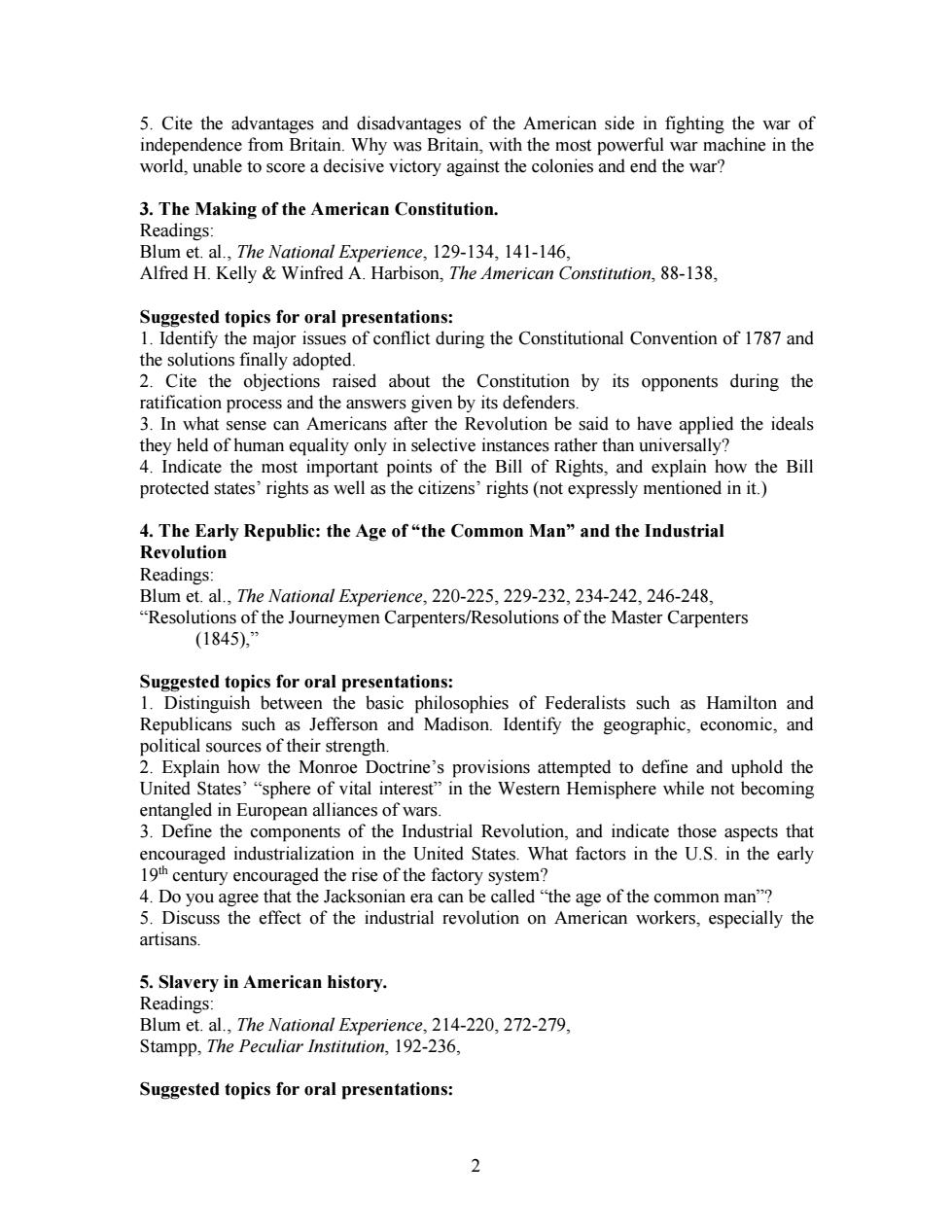正在加载图片...

5.Cite the advantages and disadvantages of the American side in fighting the war of independence from Britain.Why was Britain,with the most powerful war machine in the world,unable to score a decisive victory against the colonies and end the war? 3.The Making of the American Constitution. Readings: Blum et.al.,The National Experience,129-134,141-146, Alfred H.Kelly Winfred A.Harbison,The American Constitution,88-138. Suggested topics for oral presentations: 1.Identify the major issues of conflict during the Constitutional Convention of 1787 and the solutions finally adopted. 2.Cite the objections raised about the Constitution by its opponents during the ratification process and the answers given by its defenders. 3.In what sense can Americans after the Revolution be said to have applied the ideals they held of human equality only in selective instances rather than universally? 4.Indicate the most important points of the Bill of Rights,and explain how the Bill protected states'rights as well as the citizens'rights(not expressly mentioned in it.) 4.The Early Republic:the Age of"the Common Man"and the Industrial Revolution Readings: Blum et.al.,The National Experience,220-225,229-232,234-242,246-248 "Resolutions of the Journeymen Carpenters/Resolutions of the Master Carpenters (1845),” Suggested topics for oral presentations: 1.Distinguish between the basic philosophies of Federalists such as Hamilton and Republicans such as Jefferson and Madison.Identify the geographic,economic,and political sources of their strength. 2.Explain how the Monroe Doctrine's provisions attempted to define and uphold the United States'"sphere of vital interest"in the Western Hemisphere while not becoming entangled in European alliances of wars. 3.Define the components of the Industrial Revolution,and indicate those aspects that encouraged industrialization in the United States.What factors in the U.S.in the early 19th century encouraged the rise of the factory system? 4.Do you agree that the Jacksonian era can be called"the age of the common man"? 5.Discuss the effect of the industrial revolution on American workers,especially the artisans 5.Slavery in American history. Readings: Blum et.al.,The National Experience,214-220,272-279, Stampp,The Peculiar Institution,192-236, Suggested topics for oral presentations: 22 5. Cite the advantages and disadvantages of the American side in fighting the war of independence from Britain. Why was Britain, with the most powerful war machine in the world, unable to score a decisive victory against the colonies and end the war? 3. The Making of the American Constitution. Readings: Blum et. al., The National Experience, 129-134, 141-146, Alfred H. Kelly & Winfred A. Harbison, The American Constitution, 88-138, Suggested topics for oral presentations: 1. Identify the major issues of conflict during the Constitutional Convention of 1787 and the solutions finally adopted. 2. Cite the objections raised about the Constitution by its opponents during the ratification process and the answers given by its defenders. 3. In what sense can Americans after the Revolution be said to have applied the ideals they held of human equality only in selective instances rather than universally? 4. Indicate the most important points of the Bill of Rights, and explain how the Bill protected states’ rights as well as the citizens’ rights (not expressly mentioned in it.) 4. The Early Republic: the Age of “the Common Man” and the Industrial Revolution Readings: Blum et. al., The National Experience, 220-225, 229-232, 234-242, 246-248, “Resolutions of the Journeymen Carpenters/Resolutions of the Master Carpenters (1845),” Suggested topics for oral presentations: 1. Distinguish between the basic philosophies of Federalists such as Hamilton and Republicans such as Jefferson and Madison. Identify the geographic, economic, and political sources of their strength. 2. Explain how the Monroe Doctrine’s provisions attempted to define and uphold the United States’ “sphere of vital interest” in the Western Hemisphere while not becoming entangled in European alliances of wars. 3. Define the components of the Industrial Revolution, and indicate those aspects that encouraged industrialization in the United States. What factors in the U.S. in the early 19 th century encouraged the rise of the factory system? 4. Do you agree that the Jacksonian era can be called “the age of the common man”? 5. Discuss the effect of the industrial revolution on American workers, especially the artisans. 5. Slavery in American history. Readings: Blum et. al., The National Experience, 214-220, 272-279, Stampp, The Peculiar Institution, 192-236, Suggested topics for oral presentations: